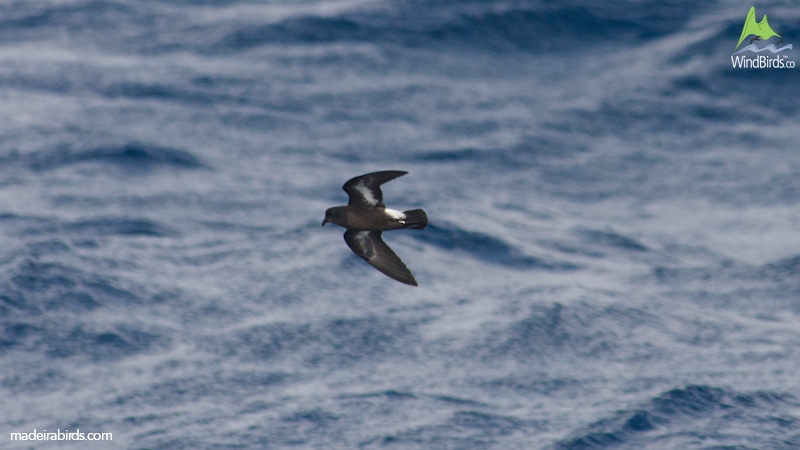European Storm Petrel Hydrobates pelagicus (Linnaeus, 1758)
Order: Procellariiformes Family: Hydrobatidae Status: Vagrant to Madeira

Recommended birdwatching sea trips to watch this seabird
Zino’s Petrel Pelagic Expedition
European Storm Petrel Field ID Keys
Shape & Size
The European storm petrel is a very small seabird and the smallest of the storm-petrels. It has a small head, short neck and short body though broad, rounded wings and tail.
Colour Pattern
This is a black and white bird. Its body is dark brownish-black with a white underwing and a white U shaped rump when seen from above that extends to the sides and is visible underneath.

Behavior
It may resemble a bat flying with its fast and continuous wing beats with only short glides.
Sometimes it seats on the water with its wings open and picking food from the sea surface. It is usually a singly seabird thought it groups with other storm-petrels. In Madeira a group of up to 30 birds were observed feeding from a chum slick on a Wind Birds’ Zino’s Petrel Pelagic Expedition though usually no more than 2 birds are observed on these deep sea pelagic trips
Habitat
Hydrobates pelagicus is a pelagic bird and is often offshore. Its breeding colonies are mainly in northeast Europe and some in the Mediterranean. In the winter it normally stays off western Africa with some getting as far south as South Africa

Distinction from similar species
Due to its small size it is very distinctive though sometimes maybe overlooked in a group of Wilson’s storm-petrels. Its underwing white bars and its broad tail with no toes projected beyond it are key features to distinguish it from Oceanites oceanicus.
Hydrobates pelagicus Biometrics
Wingspan: 320 - 360 mm (Flood & Ashley, 2011)
Total length: 150 - 160 mm (Flood & Ashley, 2011)
Weight: 24 - 31 g (Flood & Ashley, 2011)
Other Bird Facts
Seasonality in Madeira: Observed from early May to early September
Breeding: It is consider a possible breeder to Madeira as there was once a bird nesting in Desertas Islands. Its breeding season is from May to October both in west Europe as in the Mediterranean
Diet: The Hydrobates pelagicus feeds on small pieces of offal and medusae, fish oil and marine invertebrates (Hume, 2002)

Status
Madeira local status by Correia-Fagundes et al, 2021: Seasonal
Madeira local status by Romano et al, 2010: Very rare, possible breeder
Madeira local status by Zino et al, 1995: Exceptional, possible breeder
Conservation status by the IUCN Red List Categories, 2013: Least Concern ver 3.1
Name of this species in other languages
Portuguese: Paínho europeu, Paínho de cauda quadrada
German: Sturmschwalbe
Dutch: Stormvogeltje
Swedish: Stormsvala
Danish: Lille Stormsvale
Finish: Merikeiju
Norwegian: Havsvale
Spanish: Paíño Europeo
French: Océanite tempête
Italian: Uccello delle tempeste europeo
Polish: Nawałnik burzowy
Slovak: Víchrovníček morský
Czech: Buřňáček malý
English synonyms: British storm petrel, Storm-petrel, Mediterranean storm petrel
Join Madeira Wildlife Monthly Newsletter. All the updates on your email every month.